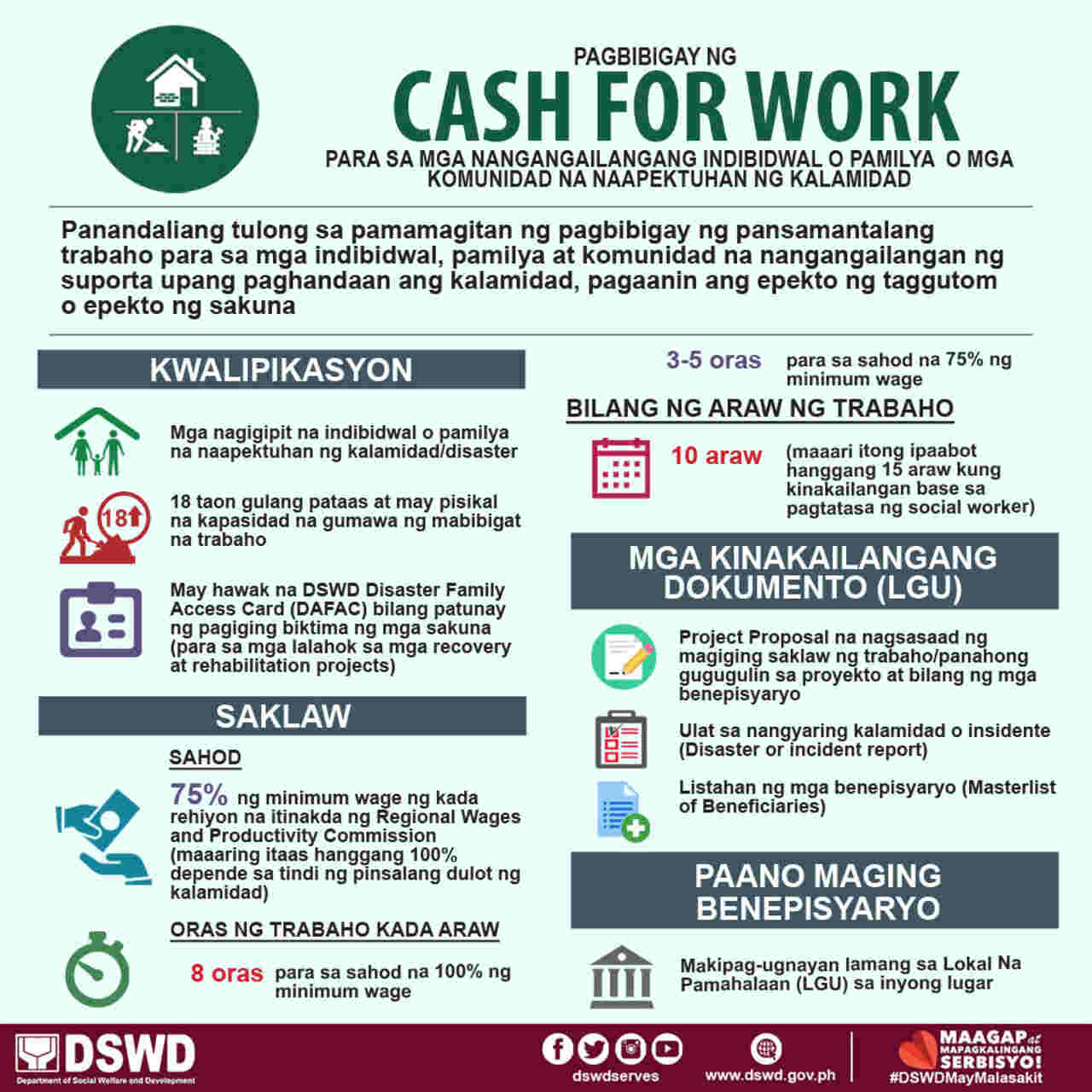The Department of Social Welfare and Development (DSWD) Cash-for-Work (CFW) program is a short-term assistance initiative in the Philippines, aimed at providing temporary employment for individuals in need. This program offers financial aid through community projects, enabling participants to earn income while contributing to essential community services. Understanding the application process is crucial for eligible individuals who wish to gain both financial support and valuable work experience through the DSWD’s CFW program.
The DSWD’s CFW initiative plays a vital role in poverty alleviation and community improvement, addressing the immediate needs of vulnerable communities. This guide provides a comprehensive overview of the application process, requirements, and types of projects under the CFW program to help prospective applicants navigate their way into this beneficial opportunity.
CFW Program Overview
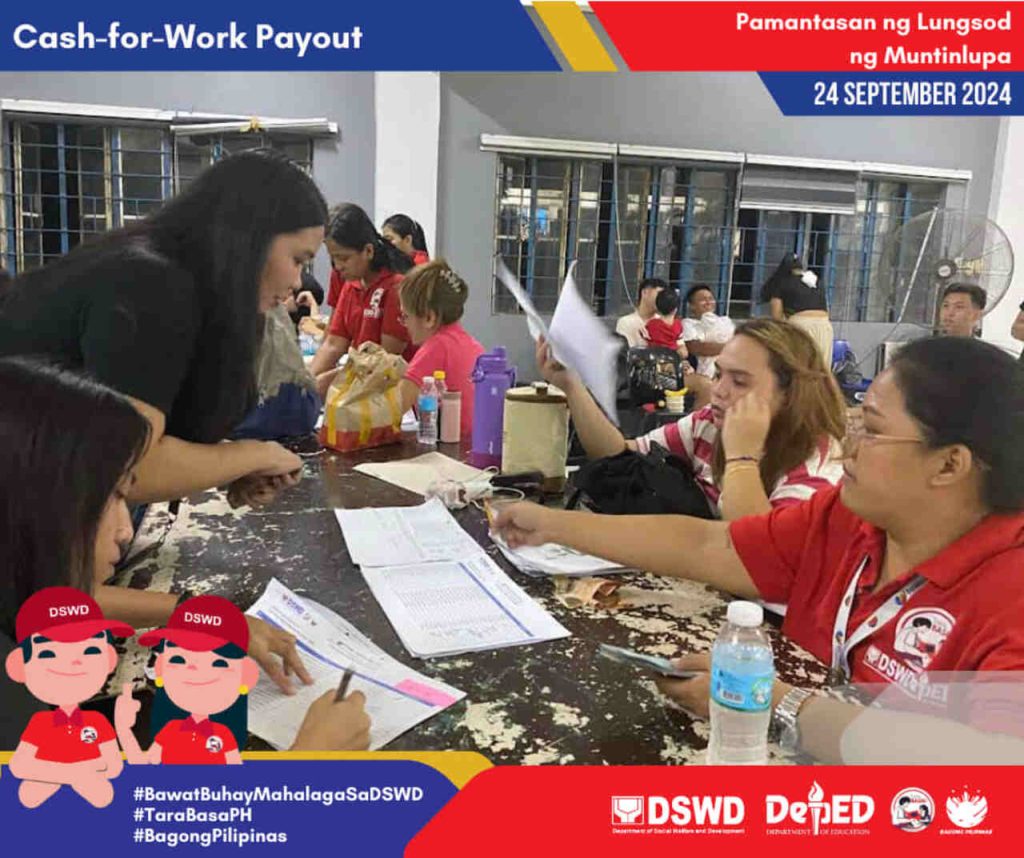
The DSWD’s Cash-for-Work (CFW) program aims to provide short-term employment to individuals from economically disadvantaged backgrounds. Through this program, participants engage in activities like environmental preservation, infrastructure repair, and disaster mitigation projects within their communities. In exchange for their work, participants receive immediate financial assistance, which they can use to fulfill essential needs, such as food and other basic requirements.
Managed by the Local Government Units (LGUs) in partnership with DSWD field offices, the CFW program operates before, during, or after disaster occurrences. It provides crucial relief and temporary income to displaced or distressed individuals, helping both the community and the workers. This initiative serves as a response to natural or human-induced calamities, promoting resilience and recovery.
Eligible Projects and Activities
CFW activities span a variety of community-based initiatives that are identified in collaboration with local leaders and stakeholders. Some of the key projects include:
- Environmental Conservation: Projects such as tree planting, reforestation, and coastal clean-ups aim to protect and preserve natural resources.
- Small-Scale Infrastructure: Construction or repair of community facilities, including irrigation canals, deep wells, and water systems, supports local development and accessibility to resources.
- Food Security: Communal gardening and other agricultural production initiatives contribute to the community’s food supply and self-sustainability.
- Disaster Mitigation: Activities focused on preparedness and risk reduction, like building drainage systems and water reservoirs, improve community resilience to disasters.
These projects are designed to meet local needs, promote sustainability, and empower communities through collective action.
CFW Target Projects
To focus resources effectively, the CFW program prioritizes regions highly susceptible to environmental or economic vulnerabilities. Key target areas include:
- Major River Basins: Identified by the Department of Environment and Natural Resources (DENR), these areas face recurring environmental risks.
- Urban Centers and Coastal Municipalities: Cities and municipalities prone to flooding, typhoons, or economic hardship.
- Disaster-Prone Provinces: Provinces historically affected by natural disasters, where urgent community assistance is often required.
Beneficiaries from these locations are selected based on risk factors and their ability to contribute to and benefit from CFW projects.
Target CFW Beneficiaries
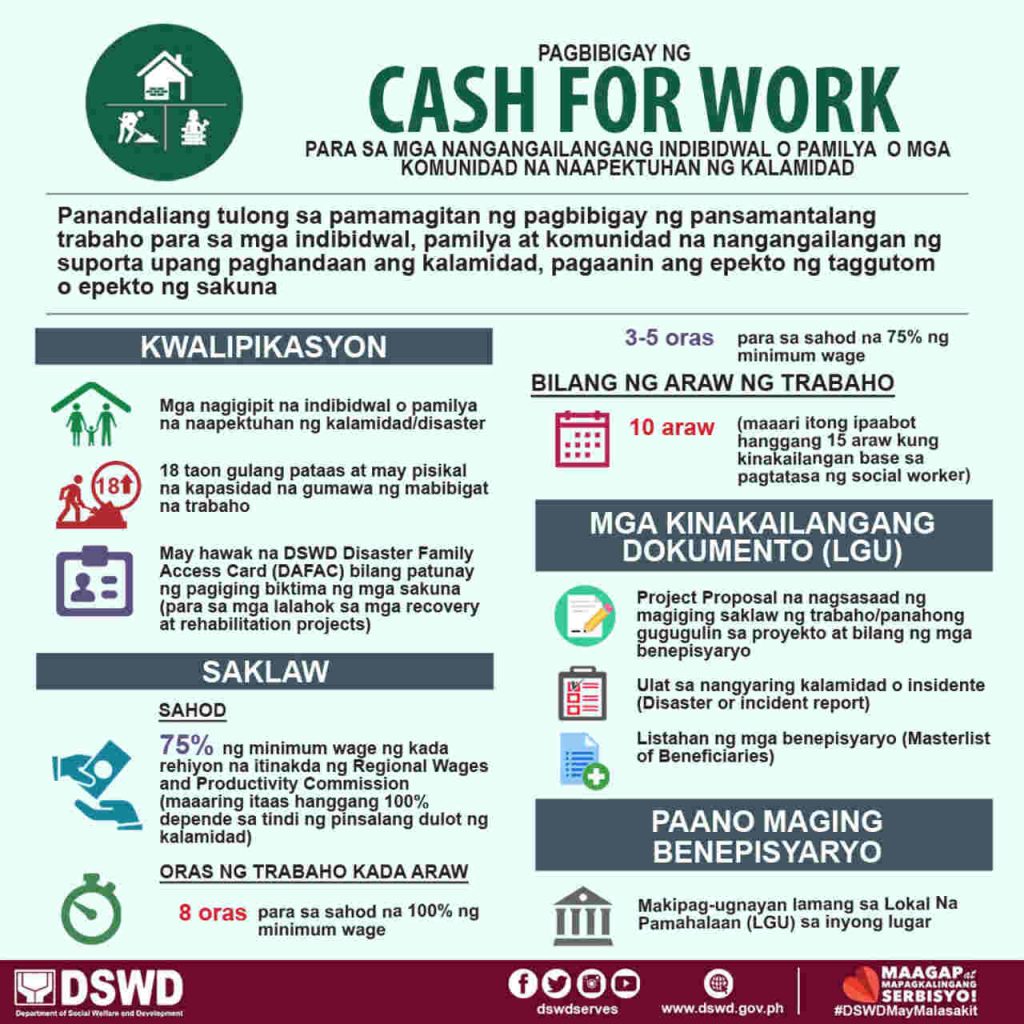
The CFW program targets economically vulnerable groups, ensuring that aid reaches those most in need. Priority is given to:
- Poor Families: Households identified under DSWD’s Listahanan poverty assessment database.
- Excluded Poor Families: Families assessed by the Local Social Welfare and Development Offices (LSWDO) but not listed in Listahanan.
- Indigenous People (IP): Indigenous communities are prioritized due to their unique cultural and economic challenges.
- Families with Vulnerable Members: This includes households with individuals such as Persons with Disabilities (PWDs), senior citizens, and solo parents.
These groups are identified as high-need sectors, often facing additional barriers to employment and resources.
Eligibility
The DSWD Cash-for-Work Program targets individuals who are in need of immediate financial assistance through temporary employment. To qualify, applicants must meet specific eligibility criteria outlined by the program.
- Must be a Filipino citizen.
- At least 18 years old or older (may vary depending on the project).
- Must belong to a household identified as poor or vulnerable.
- Willing to engage in community work for a specified period.
- Not currently employed or engaged in any other government-funded work program.
- Must submit the required documentation as specified by the DSWD.
Documentary Requirements
To apply for the DSWD Cash-for-Work Program, applicants must submit several documents to verify their identity, eligibility, and need for assistance. These documents include:
- Valid ID: A government-issued identification card (e.g., voter’s ID, SSS ID, driver’s license) to verify the applicant’s identity.
- Proof of Residency: Barangay certificate or any document confirming the applicant’s residence in the target community.
- Income or Poverty Status: A certification from the local government unit (LGU) or DSWD stating the applicant’s household poverty status.
- Application Form: Duly filled out application form provided by the DSWD or LGU where the applicant is applying.
- Barangay Certification: A document from the barangay to attest that the applicant is a resident and in need of assistance.
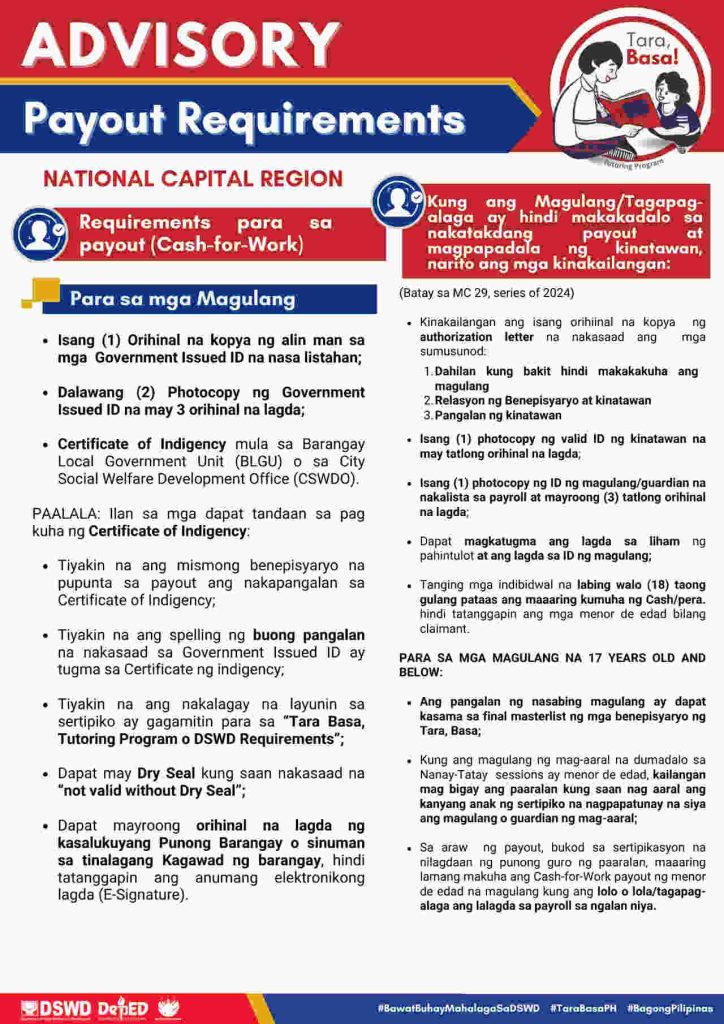
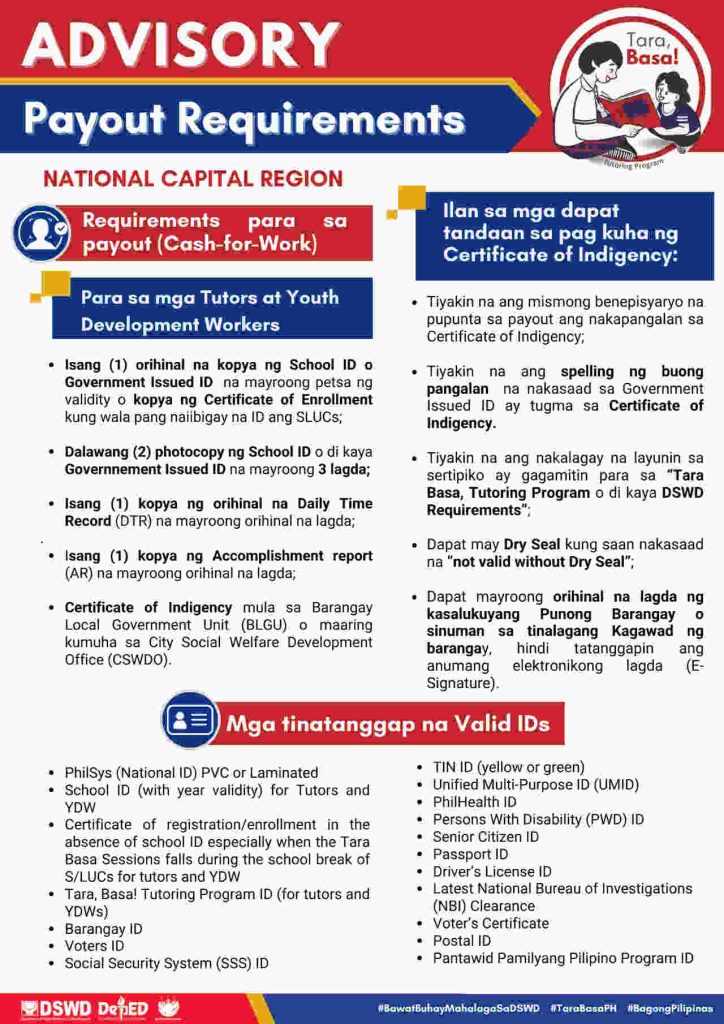
How to Apply for the DSWD Cash-for-Work Program
To apply, here are the steps to follow:
Step 1: Announcement and Information Sharing
The DSWD and LGUs announce open applications through local government offices, community meetings, social media, and the DSWD website. This helps inform interested individuals about eligibility and application steps.
Step 2: Registration and Pre-screening
Eligible individuals submit their details and basic documents to the designated registration center. This initial stage verifies that applicants meet program criteria.
Step 3: Form Submission and Document Verification
Applicants must complete and submit a form that includes personal and household information, alongside identification and residency proofs. DSWD officials then verify these documents for eligibility compliance.
Step 4: Selection and Notification
Based on eligibility and available resources, applicants are selected through random draws or by prioritizing the most vulnerable. Selected applicants are notified of their acceptance, work assignments, and compensation details.
Step 5: Orientation and Training
Accepted participants attend orientation to understand the program guidelines, safety protocols, and expectations. Necessary training may be provided to help them execute their duties effectively.
Step 6: Work Commencement and Monitoring
Participants begin their assigned tasks, with regular monitoring to assess project progress and gather feedback. This ensures the quality and effectiveness of CFW projects.
Step 7: Payment and Compensation
Participants are compensated based on their documented hours, providing them with much-needed financial assistance. Payments help cover basic needs and contribute to economic stability within the community.
Where to Get the Application Form
Eligible individuals can obtain the application form for the DSWD Cash-for-Work (CFW) Program from their local Department of Social Welfare and Development (DSWD) office or the Local Government Unit (LGU) or designated registration centers where the applicant is applying from. Alternatively, applicants may also receive the form through their barangay officials, who assist in the registration process.
CFW for Fresh Graduates
The CFW program also offers valuable opportunities for fresh graduates, providing temporary employment and skill development. Recent graduates from universities, such as those in Benguet, have engaged in the CFW program, gaining practical experience while awaiting permanent employment.
This opportunity is particularly beneficial for graduates facing financial challenges, allowing them to earn an income, develop work-related skills, and support their families. As an added advantage, CFW placements often align with graduates’ fields of study, enhancing their job-readiness and overall employability.
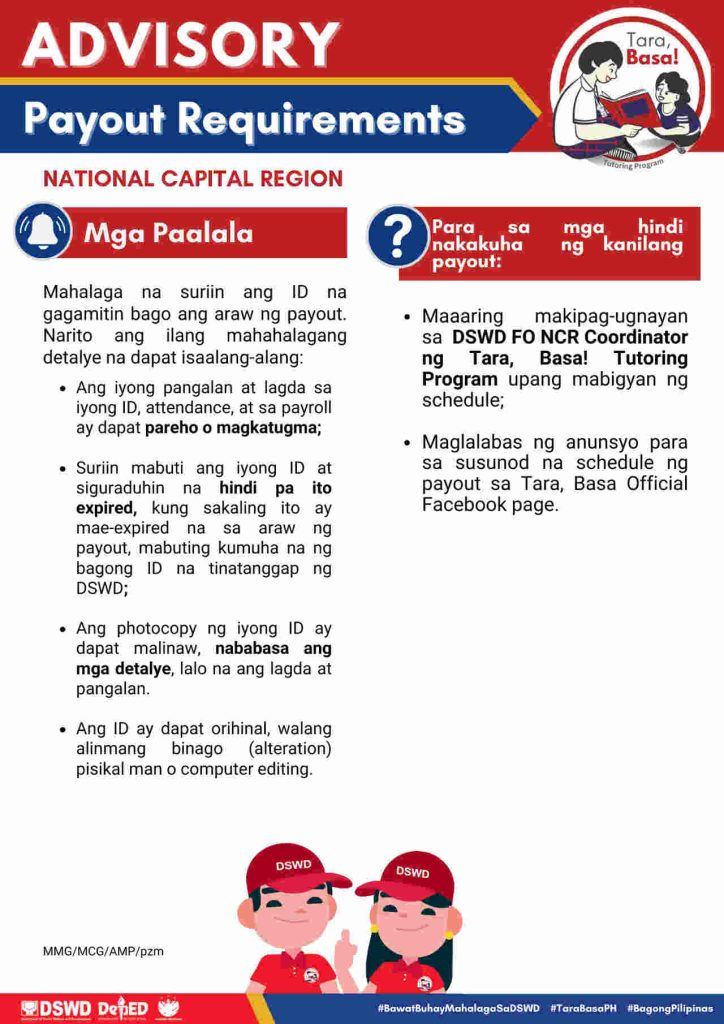
Video: DSWD Cash-for-Work
The DSWD Cash-for-Work Program is a government initiative that provides temporary employment to vulnerable individuals. Through community-based projects, participants earn financial support while helping to develop and improve their local areas. This program is a practical solution to support families in need and strengthen communities. To learn more, watch this video from Bulsu PPESO:
Summary
The DSWD Cash-for-Work (CFW) program provides vital financial support to vulnerable individuals and families in the Philippines. By engaging participants in community projects, the program offers short-term employment opportunities that benefit both individuals and communities. With clear eligibility criteria and application steps, the CFW program serves as a valuable resource for economically disadvantaged populations, contributing to poverty alleviation and community resilience.
